Russia This Week is a weekly review by the MEMRI Russian Media Studies Project, covering the latest Russia-related news and analysis from media in Russia, the Caucasus, Central Asia, and Eastern Europe.
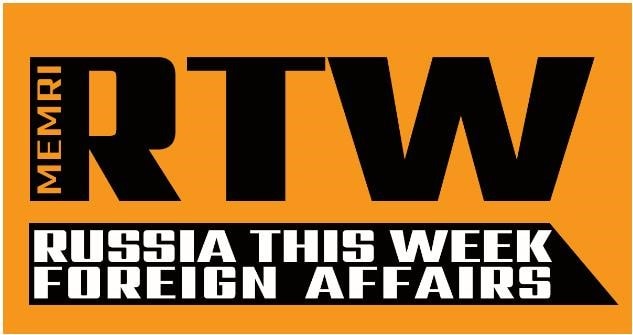
Photo Of The Week
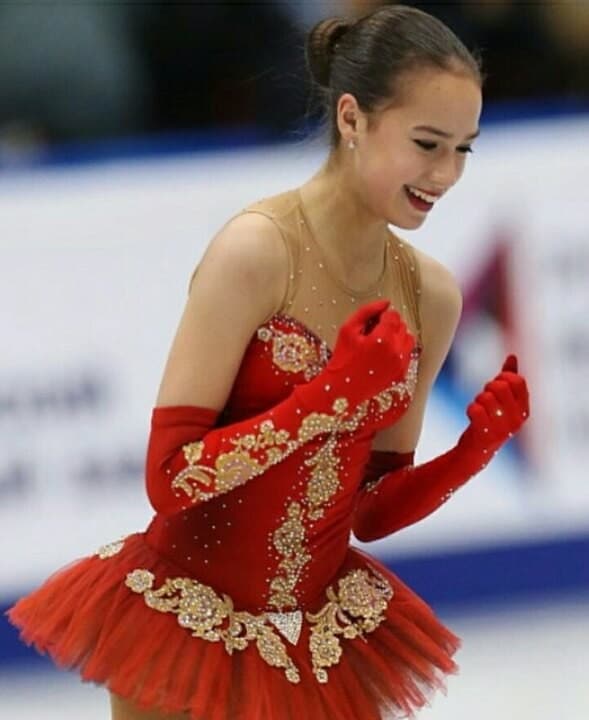
Figure skater Alina Zagitova, 15, wins the first gold medal for the Olympic Athletes from Russia (OAR) at the Pyeongchang Winter Olympic Games (Source: Liveinternet.ru, February 23, 2018). Russia is not allowed to compete in the Games in South Korea, due to accusations of state-sponsored doping. Nevertheless, 169 Russian athletes were allowed to compete under the OAR banner. See also Comment by the Information and Press Department on false accusations of Russian interference with the Winter Olympic Games in the Republic of Korea, February 7, 2018.
Putin Says
On February 9, during the Congress of the Russian Union of Industrialists and Entrepreneurs, Russian President Vladimir Putin stated:
"As you are aware, the policy of restrictions has been in place for a very long time now, always, in fact. The 'Magnitsky Act' was adopted without any substantiation on the day the Jackson-Vanik amendment was repealed. This was long before the events in Ukraine or Crimea. They did so just because that is their preferred way of dealing with us.
"To reiterate, I think that they will soon get tired of it. Still, I do hope that we will eventually get back to having normal relations."
(Kremlin.ru, February 9, 2018)

Putin at the Congress of the Russian Union of Industrialists and Entrepreneurs (Source: Kremlin.ru)
Quotes Of The Week
During a master class for the Leaders of Russia contest finalists, Russian Foreign Minister Sergey Lavrov said:
"Under the current situation, when eras are changing and the world is leaving the Western domination era and entering an era of multipolarity, many of our Western and European counterparts are allergic to the foreign and domestic policy successes achieved by our country… [The U.S.,] after centuries of global domination, it is now forced to see its own failing attempts to resolve each and every issue and impose its will on everyone… The development of a multipolar world will not be fast. It will continue to meet resistance and illegal methods are likely to be employed, such as the use of military force in breach of the United Nations Charter."
(Tass.com, February 7, 2018)

Russian FM Sergey Lavrov (Source: Uznayvse.ru)
In an interview aired by the Rossiya-24 TV news channel, Russian ambassador to the U.S. Anatoly Antonov opined: "You do not know what will happen tomorrow, how they [the U.S.] will behave...
"On the one hand, obviously one cannot solve any global issues without us, which the U.S. is aware of, but on the other hand, they are doing their best to make the Russian-U.S. relationship even more complicated, in order to prove a stumbling block here, and halt the settlement of global issues, which affect the U.S. themselves, I would mention international terrorism in the first place... We are destined for cooperation with the U.S.... the two countries need each other."
(Tass.com, February 9, 2018)
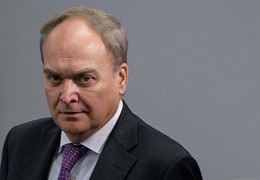
Russian ambassador to the U.S. Anatoly Antonov (Source: News.rambler.ru)
The Resignation
Senator Frants Klintsevich resigned as deputy head of the Russian Federation Council's Defense Committee.
Commenting on his resignation, Klintsevich explained: "Apparently, not everyone at the Federation Council liked my openness."
According to Russian newspaper Moskovskij Komsomolets, the resignation comes after the Russian Ministry of Defense's dissatisfaction with Klintsevich's statements on the downing of a Russian Su-25 SM in Syria, on February 3, 2018.
On February 7, Klintsevich stated that the Su-25 was shot down by Soviet-designed Igla MANPADS. He then added that Syrian special forces obtain downed Russian Su-25 aircraft's debris. However, the Ministry of Defense denied Klintesvich's statements.
(Mk.com, February 13, 2018)
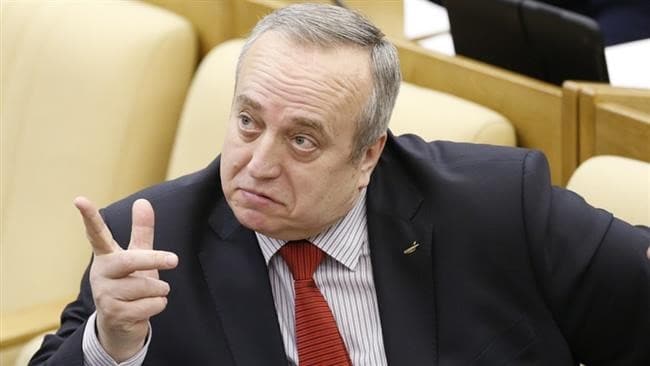
Senator Frants Klintsevich (Source: Presstv.com)
In The News
Iskander Missile System in Kaliningrad
Head of the Defense Committee in the State Duma Vladimir Shamanov stated that Russia deployed Iskander tactical missile systems in the Kaliningrad Region. Lithuanian Defense Minister Raimundas Karoblis said that NATO should come up with a response to the deployment of Iskander missile systems in the Kaliningrad Region. Kremlin spokesperson Kremlin Spokesman Dmitry Peskov commented: "I want to remind you that placing particular armaments and deploying specific military units on Russian territory are solely the sovereign issue of Russia."
(Tass.com, February 6, 2018; Read full article)
The chairman of the Federation Council's Defense and Security Committee, Viktor Bondarev, commented: "A sovereign country has the legitimate right to place units of the Armed Forces, armaments and equipment on its territory wherever it finds such placements necessary and it doesn't have to report to anyone... It's time to make a reminder to the official representatives of Western organizations who may have forgotten geography that the Kaliningrad region is a constituent territory of the Russian Federation. It's our legitimate enclave in a hostile Baltic environment around it... Iskander is a non-strategic weapon and that's why it doesn't fall into the realm of restrictions specified by the New START treaty," he said.
(Tass.com, February 15, 2018)
During a press conference, NATO Secretary General Jens Stoltenberg called on Russia "to be transparent" concerning the deployment of Iskander missile systems in Kaliningrad. "And that's one of the reasons why we also think that the NATO-Russia Council is useful, because we use the NATO-Russia Council to brief on military exercises, but also military posture. So, we call on Russia to be transparent."
(Nato.int, February 14, 2018)
Answering to Stoltenberg's remarks, Konstantin Kosachev, the chairman of the Federation Council's Foreign Policy Committee, stated: "In all likelihood, the causes are the same, namely, NATO still need a huge and ominous foe – in the first place, for fulfilling Washington's ultimatum to the allies and to make them hike military spending to 2% of the GDP [in each member-state]... It's extremely difficult to motivate the economical Europeans to spend if there's no outside threat."
Kosachev also commented on Stoltenberg's reference to the NATO-Russia Council. Kosachev opined: "Wasn't it Brussels that persistently closed down the dialogue channels with Russia?" He then added: "As far as I know, psychologists describe the inability to foresee the aftermaths of one's actions as a property of infantilism... NATO's hurt feelings over Russia's reciprocal steps – like the Americans' grudges against the symmetric reduction of the U.S. diplomatic staff in Russia after Washington initiated the diplomatic wars – fall very much into the same category."
(Tass.com, February 16, 2018)
Aleksandr Grushko, Russian Deputy Foreign Minister and Russian former envoy to NATO, commented: "We see that right now NATO has been reinforcing is eastern flank to protect itself from the non-existent threat, and employing deterrence schemes of the Cold War-era... Moreover, the alliance sticks to the decisions of the Warsaw and Wales summits to end cooperation with Russia... We are open for dialogue and we have suggested various ideas on how to organize it via bilateral channels with separate members of the alliance – for example, with the Baltic states – on the basis of existing agreements aimed at preventing military incidents. We were ready to work with NATO in a collective format as well, but no progress has been made in this direction so far... Our policy is relatively calm. From the military point of view, Russia takes all necessary measures needed to protect our security interests and make sure that our national defense remains at a proper level."
(Tass.com, February 16, 2018; Tass.ru, February 15, 2018)
Arms Sales
-
Moscow and Bangkok have signed an agreement on the supply of Kalashnikov assault rifles. (Tass.com, February 6, 2018; read full article)
-
Indonesia inked a deal to buy 11 Sukhoi Su-35 jets from Russia. The contract is worth a total US$1.14 billion, Indonesia defense ministry spokesman Totok Sugiharto said. (Channelnewsasia.com, February 19, 2018)
-
Commenting on negotiations on supplies of Russian S-400 missile systems to Saudi Arabia, Saudi Ambassador to Russia Raed bin Khaled Qrimli said: "Regarding the S-400, detail discussions are continuing between the two sides on the final arrangements of this. We are discussing technical issues, especially regarding technology transfer and know-how." (Tass.com, February 19, 2018)
Russia-Argentina Relations
Argentinian MP Roma: Argentina Leans Towards Russia Due To Geopolitical Realities
Argentinian MP Carlos Roma, president of the group of Friendship with the Russian Federation in the House of Representatives, said that the political changes taking place in the world made possible, for the Argentinian government to show an increased and unexpected interest towards Russia.
"What brought us towards Russia is a direct consequence of international geopolitics," noted Roma.
The MP stressed that this is "a personal opinion" and also indicated that "there is not much awareness about the complementarity between Argentina and Russia."
"Many leaders remain stuck to their political discourse of the 70s and 80s and did not evolve their analysis of world geopolitics," said the MP.
The president of the Group of Friendship argued that indeed Russia "represents a different vision for the world."
In the same manner as "the world changed, Russia is not the same as in the 90s and, having become neo-liberal, emerged as an autonomous and self-sufficient nation."
"The Russia that Putin built, proceeds along two axes: it enshrines every activity under the umbrella of the International Law and of the Chart of the United Nations and presents itself as the guarantor for peace," Roma said.
This attitude "helps us to be more friends than ever since these are the same values which are observed by Argentina" although "there actors who do not share the same view," he stressed.
The Spanish version of Sputniknews.com also wrote: "The evidence of the rapprochement between Buenos Aires and Moscow is given by the Argentinian President Mauricio Macri's visit to Russia, which also laid the basis for an official trip of an Argentinian delegation led [on February 7-8] by Argentina's Secretary of International Economic Relations, Horacio Reyser, who attended the Argentina-Russia Intergovernmental Commission."
Roma specified that among the first achievements of the Commission should be mentioned some projects to be developed in the domain of nuclear energy, mainly related to the exploration and exploitation of uranium reserves. Argentina is specialized in the construction of reactors for the production of isotopes whereas Russia is valued for the construction of generators, commented the MP.
"It's a technical job that can produce many fruits because both countries have a longstanding experience in this field," Roma said.
Some progress is also expected in the agro-industrial field and in farm equipment. "There are Russian firms which are interested in Argentinian farming equipment and we are interested in sending more agricultural products to Russia," he added.
More channels of cooperation between the two countries might involve an integration between the two university systems, without forgetting the bridges that can be established in the field of culture. Furthermore, there might be progress in the inter-exchange of professionals for learning about the Russian experience in the field of Olympic sports and the development of Olympics infrastructure.
For its part, the Group of Friendship with the Russian Federation will ensure that the Group is representative of all the parties in the Argentinian Parliament and the Senate.
(Sputniknews.com, February 15, 2018)
See also:
-
Argentine President Mauricio Macri met with Russian Security Council Secretary Nikolai Patrushev met in Buenos Aires. Macri and Patrushev discussed technical-military cooperation. (Infobae.com, December 5, 2017; read full article in Spanish)
-
Russian Security Council Secretary Nikolai Patrushev and Argentine Secretary for Strategic Affairs Fulvio Pompeo have signed a memorandum of cooperation. (Tass.com, December 6, 2017; read full article)
-
Russian Embassy in Argentina caught up in cocaine smuggling probe. (Themoscowtimes.com, February 23, 2018; read full article)
See also MEMRI Special Dispatch No. 7341, Russia In The World – Russia In Latin America Part II, February 18, 2018.
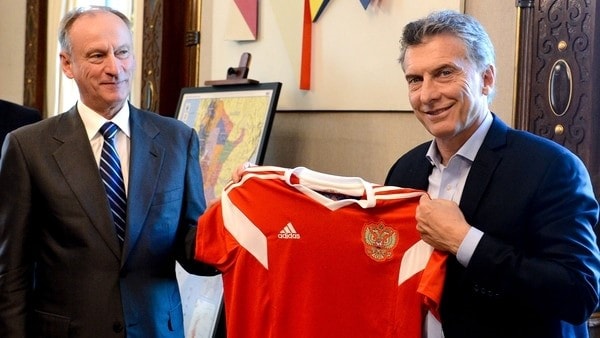
Argentine President Mauricio Macri with Russian Security Council Secretary Nikolai Patrushev (Source: Infobae.com)
News In Short:
- The Kremlin rejects accusations of Russia being behind the NotPetya cyber-attack on Ukraine in June 2017 (Tass.com, February 15, 2018; Read full article)





